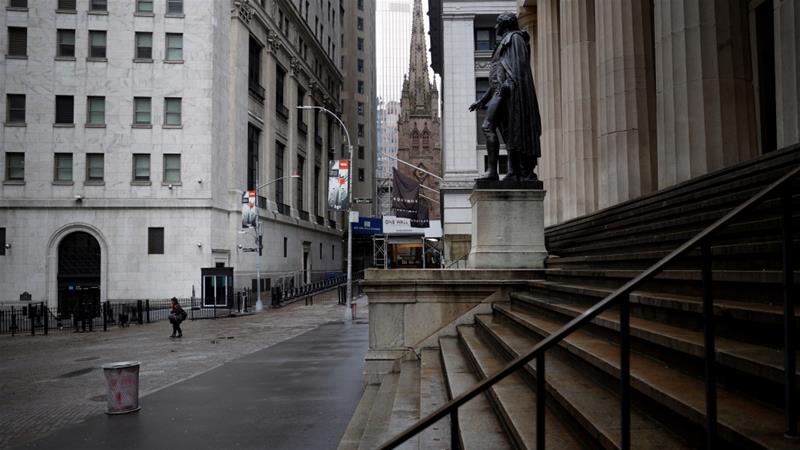The Dow Jones Industrial Average rise was slightly to the plus side about an hour into trading in New York, up 25 points or 0.11 percent. The S&P 500 – a gauge of the health of US retirement and education savings accounts- was up 0.22 percent, while the tech-heavy Nasdaq Composite Index up 0.19 percent to the plus side.
Investor sentiment was lifted after a $500bn virus relief package for small businesses was approved by the US House of Representatives on Thursday. President Donald Trump is expected to sign it into law.
Still, the benchmark S&P 500 is 17 percent below its record February high despite gaining ground this month on the back of trillions of dollars in stimulus.
Given the economic slump, closure of businesses and halt of all non-essential public life, investors fear a deep recession is under way. Data on Thursday showed that an additional 4.43 million Americans filed for unemployment benefits last week, bringing the five-week total to 26 million.
Read Also: Global Stocks Climb As China Data Beats Expectations
Analysts predict a 14.1 percent downturn in S&P 500 first-quarter earnings, with profits for the energy sector estimated to slump nearly 60 percent, raising fears of debt defaults, layoffs and possible bankruptcies.
Oil prices continued to recover after an especially painful start to the week. Brent crude, the global benchmark, which hit 1999-level lows earlier this week, was holding at above $21 a barrel. US benchmark West Texas Intermediate crude, which turned negative on Monday, was up slightly at about $17 a barrel.
“We got a small dose of bizarre on Monday this week,” Bjornar Tonhaugen, head of Oil Markets at Rystad Energy, wrote in a Friday note. “A major shock is brewing for producers and unless there is a firmer response from their side to voluntarily slash output, we will soon be discussing about the greatest energy crisis in history.”
The Dow energy sector was barely in positive territory in morning trading.
“We forecast that most commodities prices will end the year higher, but we do not expect prices to return to their pre-virus levels until 2022 at the earliest,” Caroline Bain of Capital Economics wrote in a note on Friday.
“The prices of nearly all commodities have fallen since the start of the year as virus-containment measures have led to a collapse in demand. A somewhat stronger US dollar has also weighed on prices,” she added.
Shares of aircraft giant Boeing were down more than 4 percent in morning trading in New York after Bloomberg news report the aerospace giant is planning to cut 787 Dreamliner output by about half.
On the tech front, shares of chip giant Intel Corp were down 2 percent in morning trading in New York after the chipmaker forecast second-quarter earnings below expectations and said it could not yet issue a forecast for the full year.
Verizon Communications Inc inched slightly lower after it said it lost 68,000 phone subscribers who pay a monthly bill in the first quarter.
SOURCE: AL JAZEERA NEWS
